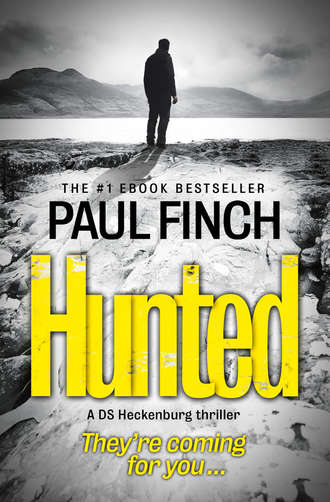
Полная версия
Hunted
Heck glanced at his watch. It was just past noon, and his appointment with DCI Will Royton at Reigate Hall Police Station wasn’t due until two – which perhaps gave him enough time to make a few quick enquiries of his own.
It was a dry day with no rain forecast, and Heck was only wearing casuals – jeans, a T-shirt and training shoes. But just to be on the safe side, in case someone came along and felt like asking questions, he donned a yellow/green high visibility doublet with the word POLICE stencilled on the back before trudging between the gateposts and up the drive. He’d been informed that there was no point calling at the house as there’d be nobody there. Apparently Lansing had lived alone; he’d employed the Beethams, an elderly couple, as housekeeper and gardener, who – very conveniently, perhaps too conveniently – had been away together on holiday on the day of his accident, and both of whom were now presumably looking for jobs elsewhere. But it couldn’t do any harm to check.
He walked along the front of the house, which was very well concealed from the road by the near-impenetrable hedge, the net effect of which was to create a real air of privacy. It had five large downstairs windows, suggesting a spacious interior, though all their curtains had been drawn, which was perhaps understandable with the lord of the manor recently deceased. The front door was a huge slab of varnished oak studded with brass nail-heads, and was firmly closed. To one side of it a slate plaque bore the legend Rosewood Grange, and underneath that there was a brass button. Heck pushed it, the bell sounding deep inside the house; a dull, reverberating jangle, as though great pieces of hollow metal were knocking together – but it brought no response.
Eventually he continued along the front of the building and around to one side, where the drive became a parking space large enough to accommodate as many as four or five vehicles. From here, a paved path led him onto a lawn the size of a junior football pitch and dotted with white wrought-iron garden furniture. On the right of that, a newly built annexe was attached to the rear of the house, with a row of circular portals instead of full-sized windows. When Heck glanced through one of these, he saw an indoor swimming pool, a blue rubber sheet resting on its undisturbed surface. The rest of the pool area – the tiled walkways around it, the frescoes of dolphins and mermaids on the walls, the additional pieces of furniture – lay in silent dimness.
Heck turned to check out the rest of the rear garden, which was even more expansive than he’d expected. Beyond the lawn lay flowerbeds and topiary, through the midst of which a central walk led away beneath a trellis roof woven with leafy vines, presumably to connect with other lawns, maybe with one of those ornamental lakes or fish ponds. Overall, it was a majestic scene; the evergreens handsomely pruned, the blooms in full summer profusion. Yet the stillness that pervaded this place, and the quiet – it was almost as if the birds themselves were observing a reverential silence – gave it a melancholic air. It could be quite a while before anyone else enjoyed the late Mr Lansing’s garden, and who knew what condition it would be in by then.
From somewhere nearby came an echoing clank.
Another sound followed on its heels: a splintering crack, like timber breaking.
Heck glanced around, expecting to see someone working – the gardener perhaps, putting in one last shift before sloping off to his new life. There was no one in sight, but now Heck spied the entrance to another wooded walk. This one was in the far corner of the garden, behind a wicker gate, which for some reason hung open. Thinking this off-kilter with the overwhelming neatness of everything else on show here, Heck strode over to it. When he reached the gate he peered along a grassy, rutted side path, which meandered through a clutch of shadowy thickets. Curious about the sound he’d just heard, he stepped through. It was amazing how, once he was amid the foliage on the other side, the sunlight was blotted out and yet the air remained warm, turning muggy. Insects droned; spiders’ webs dangled between the intertwining branches. About thirty yards ahead stood a small wooden structure, like a shed. The door to this also hung partly open.
Heck walked towards it, feeling, for no good reason he could explain, increasingly wary. The small structure was ancient, lopsided with dilapidation. Its door jamb was visibly broken – all that remained of its latch were a few rusty scraps hanging from loose screws. But it might have been broken for years; such damage didn’t necessarily need to be recent. He glanced inside, seeing nothing more than an old workbench and a few garden tools. A personal planner of some sort hung dog-eared on one of the walls. Alongside it there was a single window, its pane so thick with grime that scarcely any light passed in through it.
Heck stepped back and closed the door. Beyond the shed lay more open space, though no grass grew here thanks to the high branches interlacing overhead. Instead, it was beaten earth covered with pine needles. On its right sat a massive compost heap. So far so normal, he supposed, except that a few yards further on there was a second shed; larger than the first and in better condition. But this hung open too.
When Heck advanced now, he did so quickly. Even from a distance it was clear that this door had also been forced, but in this case the padlock hanging from its twisted hinge looked shiny and new. Wondering if he was about to make his first arrest in Surrey (criminal damage to a garden shed, of all things), he yanked the door open. Again, there was nobody in there, and nothing of apparent value: a few more tools, an oil can, a coil of hosepipe, a few tubs of weedkiller.
A second passed before he stepped back, closing the door, glancing around.
Deep clumps of rhododendrons ringed this area, further tracts of shady woodland lying beyond them. He listened, ears attempting to attune to the breathy rural stillness. When you were isolated on foreign soil it was all too easy to imagine you were being watched, so even though this was exactly how Heck now felt, he paid it no heed. The outline of the house was vaguely visible through the foliage. It was no more than a couple of hundred yards away, and yet suddenly that seemed quite a distance. He turned again, scanning the crooked avenues between the trees. He wasn’t a woodsman. If there was someone else here, he wouldn’t necessarily know about it. But the chances were there was no one. This was the countryside. Odd noises were commonplace.
A fierce clatter split the silence, like something fragile impacting on stone.
Heck spun, gazing deeper into the encircling undergrowth – and spying something he found a little reassuring. The upper section of another manmade structure stood beyond the rhododendrons; by the looks of it, a greenhouse. Was it possible the gardener was here after all?
He pushed further into the underbrush, catching his arms and hands on thorns, but coming out alongside the greenhouse, which he now saw was extensive, maybe forty yards in length, but in a poor state of repair; its windows were cracked and grubby, the basic ironwork from which it was constructed rotted and furred with moss. However, it was still in use. When he entered, he gazed down a central concrete aisle, to either side of which thick jungles of luxuriant plants grew from trays of black soil mounted on waist-high metal shelving. Down at the far end, transverse to the central aisle, stood another rack of steel shelving, this one taller than those on either side, rising to about head height and crammed with garden breakables; plant pots and the like, even a few figurines like gnomes and elves.
There was no one down there that Heck could see. He strolled forward – only to forcibly stop himself after several yards. Okay, he’d heard something. But did it really matter? Someone was working nearby. That was all it was. In any case, time was short; he’d come here to assess the accident scene, not flog his way through the surrounding woods, freezing like a scared rabbit at the slightest irregularity. Whether he liked it or not, it was time to return to the crash site. But as he swung round to head back, a flicker of movement caught his eye.
He glanced sharply to the far end of the aisle.
And saw it again.
It was one of the figurines on the upper shelf; definitely a gnome or elf, one of those trashy little objects which, in truth, he’d never have expected to find on a stylish estate like this – and it had just moved.
Of its own accord.
Heck stared in astonishment, trying to laugh it off as a bizarre optical illusion. But now it moved again – just slightly, the merest quiver. Again of its own accord.
Slowly, disbelievingly, he walked down towards it. ‘You’re losing it, pal,’ he said to himself. ‘You’ve got to be …’
The figurine quivered again, more violently, bringing Heck to a dead halt.
A few moments passed as man and manikin stared at each other, Heck’s neck hairs prickling. This time the thing remained stationary, even when he advanced again and came up close to it. It was exactly what he’d thought it was: a garden gnome, complete with beard, pointed nose, pointed ears, and pointed hat. It was about a foot and a half in height, and its once-garish colours had mostly weathered away. And yet it was hideous – so much so that he grimaced as he lifted it down from the shelf.
Where each of its eyes had once been, a black X had been etched, first gouged with a blade, and then filled in with black pen. Its mouth was a thin red line, with red trickles added to either side to create a vampire effect. Either the original paint job had run, or someone else had been handy with a different-coloured pen. For all his revulsion, Heck turned it several times in his hands, but could find nothing out of the ordinary. It was no more than a lump of sculpted, slightly mouldy plaster. He placed it back on the shelf and stepped back. Bewildered.
And then the disfigured gnome leaped at him.
Literally launched itself from its perch, and descended to the concrete floor. Its head broke off with the impact, rolling towards Heck’s feet, where it came to a rest, gazing up at him with those unblinking, crossed-out eyes.
Heck was at first too stunned to react. He gazed back down at it, then at the rack – just as another object, a plant pot, also made a suicidal leap, exploding into a thousand fragments. A second pot followed from the other end of the shelf, and then another. Heck backed away involuntarily, hair prickling again, the sweat chilling on his neck and chest. A fifth object hurtled down; another gnome – this one landed upright and didn’t shatter, but stood rocking back and forth as if the moment it regained its balance it would come toddling towards him. A sixth object went, and a seventh – more plant pots, all exploding on impact. Heck’s hair was now standing on end, but then he spotted the culprit – the sleek brown form and whipping tail of a rat as it scuttled back and forth in the recess at the rear.
Heck sagged with absurd relief; he had to lean forward to get his breath.
When he looked again, the rat had fully emerged. It bounded to the floor and bolted away beneath the shelving on the left.
‘You get a move on, lad,’ Heck said under his breath, thanking God that none of the local officers he was shortly to be ‘advising’ had been around to witness that little pantomime. ‘There’s no wasting time in your game …’
He walked back along the aisle to the greenhouse entrance, heading through the rhododendrons, bypassing the compost heap and the two wooden sheds, and lurching down the path between the thickets. Even on reaching the front of the house, it was several seconds before he felt his heart rate begin to slow. He took a couple of deep breaths in order to regain full composure. He hadn’t discovered the source of the metallic clattering, of course, but again – did that really matter? It wasn’t like he didn’t have any real work to do.
He walked on down the drive and returned to the road, where he dug a fresh pair of latex gloves from the pockets of his doublet and snapped them into place. A fingertip search was just the thing to concentrate his mind.
Inch by painful inch, sometimes on his knees, he worked his way along the verge on the side where the undergrowth had been torched, initially focusing on the glistening debris that had been swept into the gutter by passing vehicles but then scanning further afield as well. There was nothing instantly noticeable, which wasn’t entirely surprising as he didn’t really know what he was searching for, and was still a little distracted – he couldn’t help but keep throwing glances over his shoulder at the silent, locked-up house. He still felt as if he hadn’t been quite alone over there, but about ten minutes into his search something else caught his attention, something a lot more tangible: a tiny white object gleaming amid the charcoaled roughage.
He poked at it with a pair of tweezers, attempting to tease it into view.
It was a tooth – and by the looks of it human, a molar in fact. What was more it had recently been removed from its owner’s jaw, because though several of its roots had been snapped, a couple had been wrenched out in full, and tiny threads of reddish-brown tissue were still attached. He fed it into a small sterile evidence sack, which he then sealed. When he held it up to the sunlight, the tooth’s underside was crusted reddish-brown. More blood – which was explainable, because this was an adult-sized molar, and adult molars didn’t come out easily.
Heck pocketed it, marked the spot of its discovery with an evidence flag, and continued his search, but nothing else of consequence emerged in the next hour, at the end of which he took some pegs and fluorescent tape from the boot of his car and cordoned off several areas. It irked him that this crime scene – and he already had a strong feeling that this was what the accident site was – had not been preserved for more detailed forensic examination. Of course that could still be arranged, though it might already be too late.
Reigate Hall was an unusually attractive building for a police station, built from eroded Georgian brick with a lopsided roof of crabby, moss-covered slates. It looked more like a moot hall or village almshouse than a focal point of modern day law enforcement, and faced onto a pleasant open green, at one end of which stood an old parish church, and at the other a timbered, ivy-clad pub called the Ploughman’s Rest, which was where Heck’s room had been booked. The green was surrounded on its other sides by whitewashed terraced cottages, craft shops, and village stores.
Detective Chief Inspector Will Royton appeared to suit this benign environment perfectly. He was a tall, well-built man in his late forties, with a bald pate and salt-and-pepper tufts behind his ears. He had an amiable air and a friendly face, and he greeted Heck in his office with a smile and a firm handshake.
‘You found us all right?’ he said, wasting no time in heading off down the adjacent corridor.
Heck followed. ‘No problem, sir.’
‘Only I’m a bit puzzled …’ Royton glanced back as he walked. ‘I mean about why the Serial Crimes Unit wants to look at the Lansing incident. Wouldn’t have thought it’d be your cup of tea at all?’
Heck shrugged. ‘There may be nothing in it for us, sir, but, I don’t know, something about it caught my guv’nor’s attention. I won’t be in your way for long.’
At the end of the passage, a pair of glazed double doors gave through into the main CID office. Here, Royton paused to think. ‘You mean caught her attention on the basis that it may actually have been a double homicide?’
‘Too early to say, sir.’
‘On the basis that it may be part of a series of homicides?’
‘That would really be running before the horse to market.’
‘Nevertheless … you wouldn’t be here if that wasn’t a possibility.’
‘It’s a very remote possibility.’
‘A possibility is a possibility, Sergeant. For what it’s worth, if something that serious is occurring on our patch, I’m glad you’re on board. We can always use someone with expertise.’
They pushed through into the detectives’ office, or DO as it was usually known, a modern, spacious area lined with desks, chairs, and computer terminals, but only occupied by one or two individuals at present, all of whom were beavering away at their desks. Royton led Heck to its farthest corner, where a large window half-covered by Venetian blinds gave out onto the village green. In front of this, two desks directly faced each other. A young woman was seated at the one on the right, tapping at a keyboard. She didn’t look up as they approached.
‘But I have to tell you,’ Royton added, ‘you’re not the only one who found this event suspicious. DS Heckenburg, meet DC Gail Honeyford.’
The woman glanced round. She was even younger than Heck had first thought; in her mid-twenties at most, her lithe, youthful form accentuated by a tight blue skirt and blue silk blouse and scarf, her brunette tresses tied in a single ponytail. A pair of fashionable shades were perched above her fringe.
‘Erm … hello,’ Heck said, mildly confused.
‘That’s your desk.’ Royton indicated the empty workstation. ‘You’ve got a telephone line, computer link, everything you need. I thought this would be an appropriate place to put you, as you two will be working together.’
‘Sir?’
‘Gail’s already on the Lansing case,’ Royton explained.
Heck tried not to look as perplexed by that as he felt.
‘Divisional CID here at Reigate Hall thought it a curious incident too,’ DC Honeyford said. ‘Before Scotland Yard did, in fact.’
‘Okay …’
‘Something wrong?’ Royton asked him.
‘No sir, it’s fine,’ Heck said. ‘Only no one told me.’
‘Perhaps you should have asked?’ DC Honeyford said. ‘Just a thought.’
This is going to be great, Heck told himself.
‘As long as we have an interest in this too, it seemed an obvious thing to put you two together,’ Royton added. ‘Create a two-man taskforce. You wouldn’t want to do it all on your own, would you?’
‘Well … as I say, sir, I’m only really here to see if this case fulfils the criteria for an SCU enquiry.’
‘So you’re not actually here to investigate the crash,’ DC Honeyford said. It was an observation rather than a question.
‘I was under the impression that had already been done.’
‘Oh, this is superb.’ She sat back as if her worst suspicions were confirmed. ‘You’re gonna be a load of help.’
‘I’ll do my best.’ Heck fished the evidence sack from his pocket and tossed it onto her desk. ‘Perhaps, while I’m getting my stuff from the car, you can log this in for DNA analysis?’
She peered down at it with distaste. ‘That’s a tooth.’
‘Yep. Found it at the crash site.’
She glanced up. ‘What were you doing there?’
‘Nothing too strenuous.’ Heck backed towards the door. ‘Just my job.’
Chapter 7
It soon became evident to Heck that, while there were no obvious serial elements attached to the two attempts on Harold Lansing’s life (if that was what they were), there was something vaguely weird about both. The fatal crash could conceivably have been an accident, though it was difficult to see how a man like Lansing, who had suffered no previous mishap on the roads and had no driving convictions, could have pulled out at such a dangerous spot without consulting the safety mirror first.
The previous incident was even more puzzling.
Lansing had owned a small fishing beat on a quiet stretch of the River Mole between Brockham and Sidlow; the rather unfortunately named Deadman’s Reach. He was in the habit of spending several hours here each weekend, coarse fishing for barbel, bream, and chub. Not a particularly dangerous pastime, one might have thought, except that on the afternoon of Saturday 21 June a large(ish) model aeroplane, which Lansing only caught a fleeting glimpse of but later described as ‘World War One style, and bluey-yellow’, nosedived him from a considerable height. Lansing, who at the time was in his usual spot, standing with rod in hand on a small stone quay on the west bank, tried to dodge away, lost his footing, and fell into the river, which was running swift and deep. Some eighty yards further down, he was swept over a weir. Had it not been for another angler, who spotted him struggling under the surface and by pure good fortune happened to be a strong swimmer, Lansing would have died there and then.
But a model plane as a murder weapon?
Heck had never heard of such a thing.
Apparently a local flying club, the Doversgreen Aviators, had been using a meadow just behind Deadman’s Reach at the time. All the club members who’d been present that day had been interviewed since, and all had insisted that the stringent safety regulations built into their sport had been strictly observed. None would admit to having lost control of their model aircraft, or even to having owned any model matching the description given. Lansing, though he’d half drowned and had been kept in hospital for quite a few days afterwards, had later told the police that he’d thought the plane, which had struck his arm as he’d tried to evade it, leaving a massive bruise, had then gone spinning out of control and landed in the water alongside him. The riverbank had later been searched but no such model was recovered.
Like the incident at Rosewood Grange, this whole thing read like an ultra-freakish accident, but two such events in two weeks – happening to the same person?
Heck pondered these unsatisfying facts later that afternoon as he parked his Peugeot in a car park to the rear of the Ploughman’s Rest, booked himself in, and took a single heavy travel bag up to the room he’d been allocated, which was small, cosy, and neatly furnished, its lattice-paned, ivy-fringed window overlooking the green.
When he came back downstairs, he spotted Gail Honeyford in the snug. A smart suit jacket was draped over the back of her chair and a glass of what looked like iced lemonade sat on the table alongside her, but again she was tapping away on her laptop. He hadn’t seen much of her after they’d been introduced that afternoon. Vacating the office for the pub was not unusual in CID circles when there was someone new in the team who needed ‘breaking in’, but it wasn’t often the case that you fled to the pub to try and get some work done. Had she felt she was more likely to make progress with whatever she was doing if she didn’t have to keep updating the new guy?
Heck wandered towards her, hands tucked into his jeans pockets. She watched him from the corner of her eye, but her facial language remained neutral.
‘Mind if I join you?’ he asked.
‘Suppose it’s a free country.’
‘Was when I last checked.’ She glanced at him fleetingly, unamused by the quip. He pulled up a chair. ‘That was supposed to be a joke, by the way.’
‘Hilarious.’ She got on with her work.
‘We’ve really started on the wrong foot, haven’t we? Can I get you a drink maybe?’
‘No thanks.’
‘DC Honeyford … you ever heard the phrase “work with me”? I’m trying to be friendly here.’
‘Yeah, I appreciate that, and look …’ She sat back, her expression softening – which suited her. On closer inspection, she was peaches-and-cream pretty with fetching hazel eyes. ‘I’m sorry if I’ve come over a little brusque. But you aren’t going to be around here very long, so I don’t see the point in us developing a relationship. Professional or otherwise.’
‘Correct me if I’m wrong, but aren’t we supposed to be forming a taskforce?’
‘That was the boss’s idea, not mine. I’ve already got this case covered.’
‘Okay, fine. In the meantime, you sure you don’t want that drink?’
‘I’m sure. Thanks.’
Heck strolled to the bar, where the landlord, a jovial, beefy-cheeked local man with a frenzy of ginger hair was happy to serve him a pint of Best. When Heck sat down again, DC Honeyford clucked with barely disguised annoyance.







